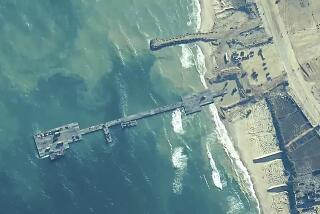Halliburton Suspends Some Iraq Supply Convoys
- Share via
WASHINGTON — Halliburton Co. has suspended some convoys delivering supplies to the military in Iraq due to escalating violence, U.S. Army and company officials said Monday, raising the danger of shortfalls in food, fuel and water supplies if the situation continues.
The company said the decision was made after supply trucks protected by U.S. soldiers were attacked Friday by Iraqi insurgents just outside Baghdad, resulting in the death of one employee from Halliburton subsidiary KBR, formerly known as Kellogg Brown & Root. Seven other employees are missing or held hostage. A soldier was also killed in the incident, and two others are missing.
Privately, company officials expressed concerns about the level of security provided to the convoy. Halliburton’s fuel convoys are protected by U.S. soldiers under the terms of a contract signed in December 2001.
“For the safety and security of convoys, the Army and KBR jointly made the decision to suspend some convoys at this time until additional security efforts can be put in place by the military to provide the new level of security necessary to move supplies into Iraq,” said Wendy Hall, a Halliburton spokeswoman. “KBR is resolved to continue support of the U.S. troops and to fulfill all contract obligations.”
Halliburton’s inability to move about the country offers evidence of how the rapidly declining security situation in Iraq -- and the military’s reliance on private contractors to supply troops and rebuild the country -- could hurt the U.S. mission.
Officials with the Army Field Support Command, which oversees the $3.2-billion logistics contract to supply troops with everything from mail to meals, said they were investigating the impact of the decision. Halliburton has other contracts in Iraq worth up to $18 billion, according to the Pentagon.
Hall said no troops had suffered shortages of fuel, food or water.
“The Army as a whole is looking at the current impacts,” said Dan Carlson, a spokesman for the Field Support Command. He declined to give details on the suspension. Neither the military nor Halliburton would say how many convoys had been suspended.
The recent increase in violence, including the slaying and mutilation of four private security workers in Fallouja, has slowed reconstruction activity. Companies have had to “lock down” their workers in their quarters in recent days as violence surged.
Because Halliburton’s support services are vital to the U.S. military, the suspension of its activities could have a potentially grave effect. The company said that since April 2003, it had provided more than 40 million meals to U.S. troops and civilians working in Iraq, delivered more than 475 million gallons of fuel and disposed of more than 1.5 million cubic meters of trash.
Peter W. Singer, a scholar at the centrist Brookings Institution in Washington who has written a book on military contractors, said the decision to suspend deliveries revealed one of the risks involved with private contractors.
The military can order soldiers to perform tasks, but contractors in Iraq are free to make their own decisions about security risks. While the U.S. can eventually hold a company responsible, there is no immediate recourse to force a civilian worker to do a job.
“There is no legal jurisdiction over these personnel to order them the way the military does a soldier,” Singer said. “That’s why these gaps in service are quite dangerous.”
But Doug Brooks, president of the International Peace Operations Assn., a security firm trade group, said it was no surprise that contractors have difficulty operating in unsafe environments.
He noted, however, that there are no reports of companies pulling out of Iraq and that resumes are still flooding in to some contractors, including those in the security sector.
He also said that in at least one incident in which a Halliburton employee was killed during a mail delivery run, the company insisted on continuing its mission even though the U.S. military had offered to take over the duties.
“Obviously the convoys are getting hit hard. You have to wonder if there is adequate security in this current situation,” Brooks said. “Contractors are tough guys. They don’t quit for no reason.”
Stephen Heering, 33, who drove trucks for Halliburton in Iraq, decided this weekend to return home after an explosion beneath his vehicle Thursday forced him to make a dangerous escape.
“I’m done. I’ll never go back,” he told Associated Press in Houston on Monday.
Details of Friday’s attack on the convoy outside the Iraqi capital remained vague.
The fuel truck convoy was near Abu Ghraib, a suburb west of Baghdad, when it was apparently attacked by insurgents armed with rocket-propelled grenades.
At least one U.S. soldier and a KBR truck driver were killed, according to the U.S.-led occupation government. Twelve people were wounded.
Six KBR employees and two U.S. soldiers remained missing, though eyewitnesses said charred bodies were seen at the wreckage of the convoy trucks, which were in flames after the attacks.
One KBR employee in the convoy, Thomas Hamill, was later seen in a video in which his captors threatened to kill him if the U.S. did not withdraw troops from Fallouja. Halliburton officials said Monday that they had no word on Hamill’s condition.
More than 30 of Halliburton’s 24,000 employees and subcontractors in Iraq had been killed since the company arrived last spring, the company reported earlier this year.
More to Read
Inside the business of entertainment
The Wide Shot brings you news, analysis and insights on everything from streaming wars to production — and what it all means for the future.
You may occasionally receive promotional content from the Los Angeles Times.










